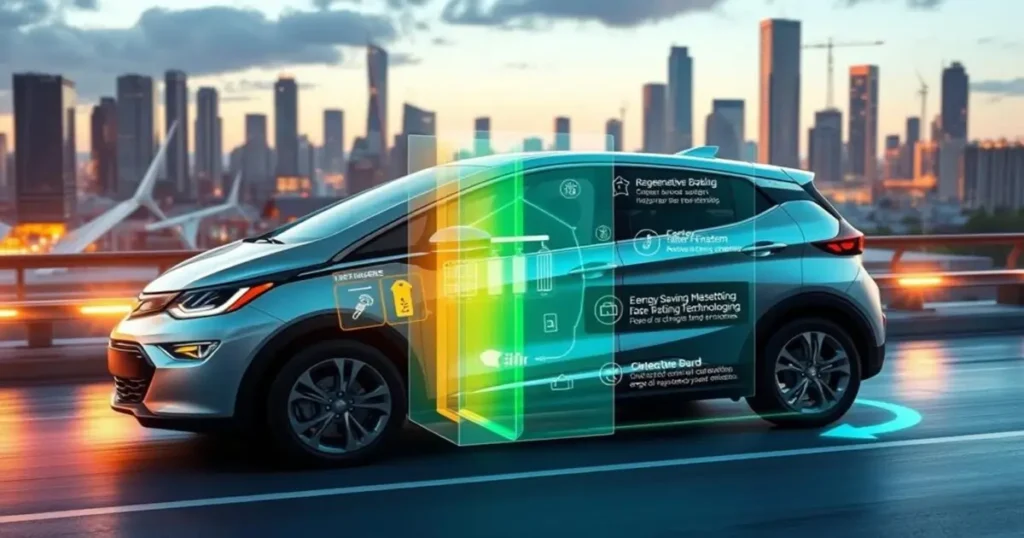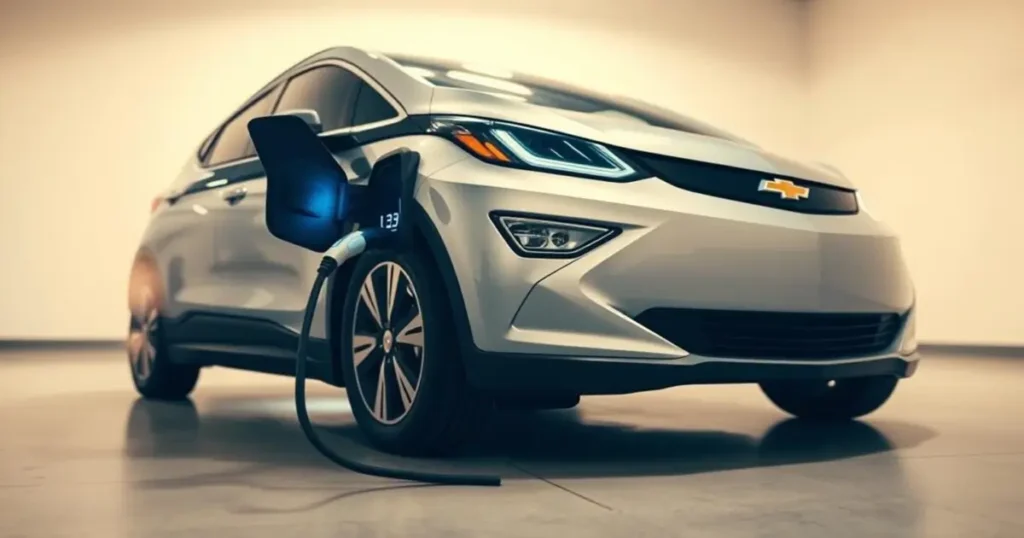The electric vehicle market has seen significant growth, and one of its standout models is the Chevy Bolt, known for its impressive driving range. With an EPA-estimated 259 miles on a full charge, it has become a favorite among EV enthusiasts.
The Chevy Bolt’s ability to retain its original range over its lifetime is noteworthy. Used models typically show a range between 133 and 325 miles at 100% charge, demonstrating its durability and efficiency. Understanding the factors that affect its range is crucial for maximizing the electric driving experience.
Table of Contents
Understanding the Chevy Bolt’s Range
One of the key considerations for Chevy Bolt owners is understanding the vehicle’s range and how it’s affected by different driving conditions. The Chevy Bolt is designed to provide a reliable and efficient electric driving experience, but its range can vary significantly based on several factors.
What is EPA-Rated Range?
The EPA-rated range is the official estimate of how far the Chevy Bolt can travel on a single charge, as determined by the Environmental Protection Agency (EPA) through standardized testing. For the Chevy Bolt, this rating is crucial as it gives owners an idea of what to expect in terms of range. The EPA-rated range for the Chevy Bolt is around 259 miles combined, with variations depending on the specific model year and trim.
Real-World Range Expectations
In real-world driving, the actual range of the Chevy Bolt can differ from the EPA-rated estimate. Factors such as driving style, conditions, and the use of climate control can significantly impact the vehicle’s efficiency. According to real-world tests, a 2022 Chevrolet Bolt EV achieved 260.1 miles on a 70 mph highway test, exceeding its combined EPA rating. The table below summarizes some real-world range tests for the Chevy Bolt.
| Test Type | EPA Rating | Real-World Result |
|---|---|---|
| Highway | 233.4 miles | 260.1 miles |
| Combined | 259 miles | 260.1 miles |
Factors That Affect Your Chevy Bolt Range
Several key factors can impact the range of your Chevrolet Bolt. Understanding these factors is essential to optimizing your vehicle’s performance and ensuring you get the most out of your battery.
Temperature and Weather Conditions
Temperature and weather conditions play a significant role in determining your Chevy Bolt’s range. Extreme temperatures, either hot or cold, can affect the battery’s efficiency. For instance, using the heater or air conditioner can drain the battery faster.
Driving Terrain and Traffic
The terrain you drive on and the traffic conditions also significantly impact your vehicle’s range. Driving uphill or in heavy traffic can reduce your Chevy Bolt’s range because it requires more energy from the battery.
Battery Age and Health
The age and health of your Chevy Bolt’s battery are crucial factors. As the battery ages, its capacity to hold a charge decreases, which can affect the overall range. Most Chevy Bolts maintain their range well over time, but factors like frequent DC fast charging can impact battery health.
| Factor | Impact on Range |
|---|---|
| Extreme Temperatures | Reduces battery efficiency |
| Hilly Terrain/Heavy Traffic | Increases energy consumption |
| Battery Age | Decreases range over time |
By understanding these factors, you can take steps to maximize your Chevy Bolt’s range and maintain its battery health.
How to Maximize Your Chevy Bolt Range
Maximizing the range of your Chevy Bolt involves a few simple yet effective strategies. By optimizing your driving habits and maintaining your vehicle properly, you can significantly enhance your car’s efficiency and driving range.
Optimize Your Driving Style
One of the most impactful ways to maximize your Chevy Bolt’s range is by optimizing your driving style. Aggressive acceleration and braking can drain the battery quickly. Instead, adopt a smoother driving habit, maintaining a consistent speed, and using regenerative braking effectively. As General Motors suggests, a more conservative driving style can lead to better energy efficiency.
Manage Climate Control Usage

Climate control, including heating and air conditioning, can significantly affect your vehicle’s range. Using these systems sparingly or employing features like pre-conditioning while still plugged into a charger can help minimize the impact on your Chevy Bolt’s range. According to a study, excessive use of climate control can reduce the range by up to 10%.
Maintain Proper Tire Pressure
Your tires can have a considerable effect on how efficiently your vehicle operates. If you have improperly inflated tires, it could lead to a decrease in driving range. Underinflated tires increase rolling resistance, which can reduce range by 3-5% for every 10% of underinflation. Maintaining the manufacturer’s recommended tire pressure is crucial for optimal efficiency. Regular checks and adjustments, especially with temperature changes, can help maintain the range. Using low rolling resistance tires specifically designed for electric vehicles can also contribute to better efficiency.
As
“Proper tire maintenance is key to maximizing your vehicle’s range and overall performance.”
, emphasizes the importance of tire care. Regular tire rotation and proper wheel alignment also play a significant role in maintaining range efficiency over time.
Charging Strategies for the Chevy Bolt
To get the most out of your Chevy Bolt, understanding its charging strategies is essential. The vehicle offers versatile charging options that can be tailored to your driving habits.
Home Charging Options
For daily driving needs, home charging is a convenient option. The Chevy Bolt can be charged using a Level 2 charger, which can be installed in your home for faster charging compared to a standard Level 1 charger.
Home Charging Benefits:
- Convenience of charging overnight
- Faster charging with a Level 2 charger
- Cost-effective for daily driving needs
DC Fast Charging Capabilities
The Chevy Bolt supports DC Fast Charging, an optional feature available on both LT and Premier trim levels for approximately $750. This capability allows you to charge your vehicle to 90 miles in about 30 minutes.
| Charging Method | Time to Charge 90 Miles | Cost |
|---|---|---|
| DC Fast Charging | 30 minutes | $750 (optional) |
| Level 2 Charging | Several hours | Installation cost varies |
Our community of Chevy Bolt drivers rates the charging experience at 3.69/5, indicating moderate satisfaction. Understanding the charging curve and compatible charging networks can further enhance your charging experience.

Real-World Chevy Bolt Range Test Results
Real-world testing of the Chevy Bolt’s range provides valuable insights into its performance under various driving conditions. The 2022 Chevrolet Bolt is known for its impressive efficiency, with ratings between 118-120 MPGe and 3.45-3.57 miles/kWh, placing it in the mid-to-high range of EV efficiency.
Highway Driving Performance
When driving on the highway, the Chevy Bolt’s range is affected by factors such as speed and aerodynamics. While its efficiency may decrease at higher speeds, it remains competitive among EVs. The Bolt’s efficiency on the highway is a testament to its overall design and engineering.
City Driving Efficiency
In city driving, the Chevy Bolt excels due to its regenerative braking capabilities. Stop-and-go traffic allows the vehicle to recapture energy that would otherwise be lost, improving its overall efficiency and range. This makes the Bolt an ideal choice for city driving, where such conditions are common.
- The Bolt’s regenerative braking system captures kinetic energy and converts it back into electrical energy, enhancing its efficiency.
- In city environments, the Chevy Bolt can achieve higher efficiency ratings compared to highway driving.
Conclusion: Getting the Most From Your Chevy Bolt
Maximizing the Chevy Bolt’s range is easier than you think with the right driving habits and maintenance. By understanding the factors that affect its range, such as temperature and driving terrain, owners can optimize their vehicle’s performance. The Chevy Bolt’s EPA-estimated 259 miles of driving range makes it an ideal choice for daily commutes. With proper care and smart charging strategies, owners can exceed this estimate. By developing efficient driving habits and maintaining their vehicle, Chevy Bolt owners can enjoy a seamless driving experience, alleviating range anxiety and making the most of their electric vehicle.